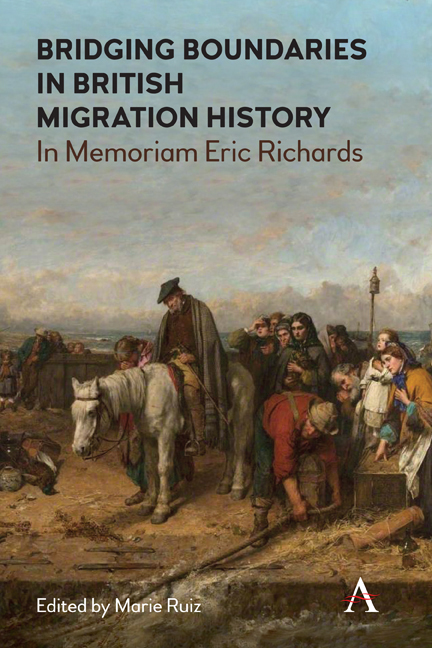Chapter 2 - Emigration at Extremes
Published online by Cambridge University Press: 20 January 2022
Summary
I wanted to say how marvellous it is that Marie Ruiz and her colleagues and sponsors have assembled such a dazzling array of talents, and also to say how pleased and honoured I am to be part of this splendid occasion. Some of you I already know, and others I’m only now meeting – some of the distant inspirations whose work I have followed from afar for over four decades. Only recently have I been introduced to Marie's own original research and the energetic stimulus she is giving to new migration research. So I extend my congratulations to our hosts and thank them for their generosity.
At the same time I wanted to say how sad and disappointed I am that David Fitzpatrick, who wanted so much to be here, is now stricken, literally by the throat, and in hospital in Belfast. I have worked with David and know him to be the sharpest mind and most elegant voice in our large coterie of emigration historians. Had he been here, it would have been a joy – and also an alarm system for any loose or conventional thinking! Let's hope he recovers fast and gets back to work – and to tennis – as soon as possible.
I’m about to consider some very small and some very large questions which form the subject matter of our endeavours relating to migration in general: I’m trying to span my own interests for over five decades; I’m also echoing my own personal migrations; and then I am going to talk rather idiosyncratically about some large questions relating to the global dispersion of parts of the British population in the great Age of Migration, which coincided with the Victorian and Edwardian eras. I want to talk about the extreme ends of the great spectrum of emigration behaviour and analysis. This addresses the venerable question of how the British and the Irish were mobilized and eventually stretched across the globe, even to the furthest antipodes, and why they did so at a specific moment in time.
Most of all, I seek answers at the far ends of the scale of the story, the micro and the macro. So I start with some tiny populations in seriously remote locations of the British archipelago, and then later I will swing to the grand intercontinental manifestations located in our swollen literature of mass international migrations.
- Type
- Chapter
- Information
- Bridging Boundaries in British Migration HistoryIn Memoriam Eric Richards, pp. 27 - 48Publisher: Anthem PressPrint publication year: 2020



